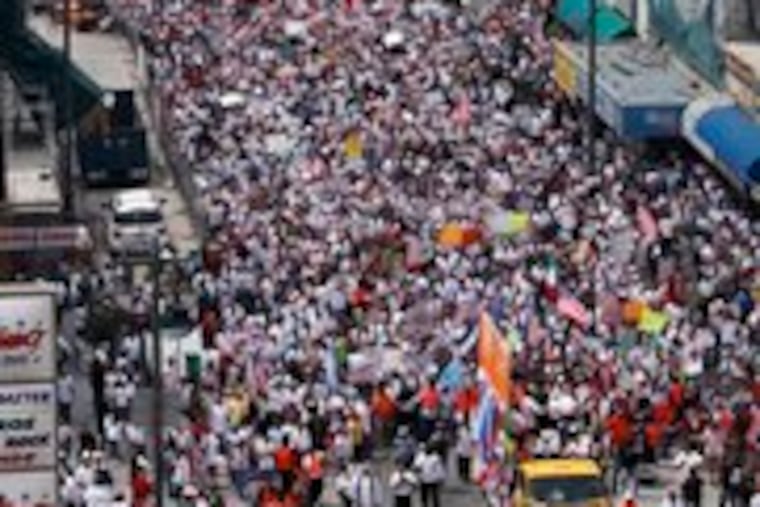Immigrant-rights marches decline in size and spirit
LOS ANGELES - The immigration-rights throngs that filled the nation's streets a year ago were noticeably thinner yesterday, leaving uncertainty about how to go about reshaping a system that both sides consider broken.

LOS ANGELES - The immigration-rights throngs that filled the nation's streets a year ago were noticeably thinner yesterday, leaving uncertainty about how to go about reshaping a system that both sides consider broken.
Organizers had long predicted lower turnouts, blaming stepped-up immigration raids, frustration that Congress has failed to overhaul immigration laws, and an effort by many groups to shift their focus from street mobilizations to citizenship and voter-registration drives.
Although fewer in number, protesters did show up in cities from Miami to Chicago to Los Angeles. But amid the waving flags, hand-painted signs, and chants, many protesters' frustration was palpable.
"After working 22 years here, paying taxes and being a good citizen, I think it's fair they give me residency," said Los Angeles protester Manuel Hernandez, 38, a Mexican who along with his wife and two children is undocumented. "It's not fair we don't have documents."
In Los Angeles, where May 1 protests in 2006 brought out several hundred thousand at various activities, about 25,000 attended a downtown rally, Police Capt. Andrew Smith said. A second rally was expected yesterday evening.
In Chicago, where more than 400,000 swarmed the streets a year earlier, police officials put estimates at 150,000, by far the country's largest turnout.
"Nothing has happened since last year," said Chicago protester Gloria Ramos, 51, who emigrated from Mexico 32 years ago. "Things are getting worse for our people - more discrimination, less benefits."
After huge marches last spring, the Senate passed a bill that would have provided a path to citizenship for many of the nation's estimated 12 million illegal immigrants.
But the bill was never reconciled with the then-Republican-controlled House, and legislation has languished since last summer. Subsequent bipartisan proposals, which Congress has not formally taken up, have gotten more conservative.
Meanwhile, federal immigration raids and deportations are increasing. In fiscal 2006, officials deported 195,024 people, compared with 173,363 the previous year, according to Immigration and Customs Enforcement data. Six months into the current fiscal year, 125,405 have been deported.
Protesters said that while anger over raids brought some people out, fear kept many at home.
Los Angeles teacher David Cid said his students were suffering because raids had separated families. Los Angeles County has about one million illegal immigrants, the largest concentration in the United States.
"They feel terrorized," said Cid, who declined to give more details on where he worked, to protect his students.
Thomas Rodriguez, 38, an illegal immigrant rallying in Chicago, also said the raids were damaging families. "We worry deportations are leaving too many young people without parents," he said.
At a rally in Jersey City, N.J., Abraham Hernandez - a native of Mexico who has worked in the United States for 16 years, enough time for him to start a family - said he was fearful of being taken away from his family if stricter immigration laws were enacted.
"I worry about it a lot," the 33-year-old Jersey City resident said. "I work every day, and when I come home I want to see my family, but maybe one day when I come home I won't see them."
Democratic Party chairman Howard Dean told immigrant supporters in Miami that an overhaul bill proposed in Congress was "insane" because it would require many illegal immigrants to return home before applying for citizenship.
"This is a government that can't find a 6-foot-4 terrorist. How is it going to find 12 million people?" he told more than 100 party supporters at Miami's Parrot Jungle Island.
In New York, immigrants and their supporters added names to a painting of a tree meant to symbolize the American family and the crucial role of immigrants in U.S. history. People in the crowd then attached leaves containing names of relatives.
"These people are hardworking people," said Jounedou Titi, a West African immigrant who has lived in the United States for eight years. "They deserve credit. And the only credit this country can give to them is citizenship."